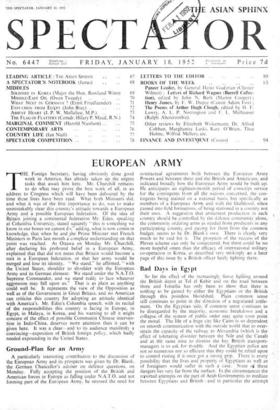EUROPEAN ARMY
THE Foreign Secretary, having obviously done good work in America, has already taken up the urgent tasks that await him here. Mr. Churchill remains to do What may prove the best work of all, in an address to Congress which will have been delivered by the time these lines have been read. What both Ministers did, and what it was of the first importance to do, was to make unmistakably clear this country's attitude towards a European Army and a possible European federation. Of the idea of Britain joining a continental federation Mr. Eden, speaking at Columbia University, stated squarely " this is something we know in our bones we cannot ch," adding, what is now common knowledge, that when he and the Prime Minister met French Ministers in Paris last month a complete understanding on that point was reached. At Ottawa on Monday Mr. Churchill, after declaring his profound .belief in a European Army, explained that that did not mean that Britain would become a unit in a European federation, or that her army would be merged and lose its identity. " We stand," he affirmed, " with the United States, shoulder to shoulder with the European Army and its German element. We stand under the N.A.T.O. Supreme Commander, and we stand really to face whatever aggression may fall upon us." That is as plain as anything could well be. It represents the view of the Opposition as well as of the Government in Great Britain, and no American can criticise this country for adopting an attitude identical with America's. Mr. Eden's.Columbia speech, with its recital of the responsibilities this country is facing in Europe, in Egypt, in Malaya, in Korea, and his warning to all. it might concern of the effect of possible Communist Chinese interven- tion in Indo-China, deserves more attention than it can be given here. It was a clear—and to its audience manifestly a convincing—exposition of British foreign policy, which badly needed expounding in the United States.


































